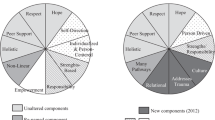Abstract
Background
The INTREPID programme of research aims to establish comparable studies of incident psychosis in a number of low- and middle-income countries (LMICs).
Discussion
The importance of this cannot be under-estimated, as this will enable the testing of existing findings and evidence across differing environmental contexts; and will permit the identification of new and unique evidence that is only apparent within specific contexts. The epidemiological, aetiological and phenomenological insights derived from this programme are likely to inform major research advances of the next decades. Of equal importance, by adopting novel methods for detecting psychosis ‘cases’ in low-resourced settings, the researchers will be able to test two key hypotheses that could revolutionize clinical research and service provision within LMIC settings: (1) that informal providers can be incorporated successfully into an adequate (and perhaps even superior) case-detection system that is community and population-based (rather than hospital-based); and (2) that informal providers can be integrated meaningfully into the pathway to care (and perhaps even long-term management) of patients with incident psychosis living in low-resourced settings.
Similar content being viewed by others
References
Saha S, Chant D, Welham J, McGrath J (2005) A systematic review of the prevalence of schizophrenia. PLoS Med 2(5):e141
Lund C, Breen A, Flisher AJ, Kakuma R, Corrigall J, Joska JA, Swartz L, Patel V (2010) Poverty and common mental disorders in low and middle income countries: a systematic review. Soc Sci Med 71(3):517–528
Cohen A, Patel V, Thara R, Gureje O (2008) Questioning an axiom: better prognosis for schizophrenia in the developing world? Schizophr Bull 34:229–244
Burns JK (2013) The social determinants of schizophrenia: an African journey in social epidemiology. Public Health Rev 34(2):1–18
Jablensky A, Sartorius N, Ernberg G, Anker M, Korten A et al (1992) Schizophrenia: manifestations, incidence and course in different cultures. A World Health Organization ten-country study. Psychol Med Monogr Suppl 20:1–97
Alem A, Kebede D, Fekadu A, Shibre T, Fekadu D et al (2009) Clinical course and outcome of schizophrenia in a predominantly treatment-naïve cohort in rural Ethiopia. Schizophr Res 35:646–654
Lambo TA (1960) Further neuropsychiatric observations in Nigeria, with comments on the need for epidemiological study in Africa. Br Med J 2:1696–1704
Susser E, Wanderling J (1994) Epidemiology of nonaffective acute remitting psychosis vs schizophrenia. Sex and sociocultural setting. Arch Gen Psychiatry 51:294–301
Cuthbert BN, Insel TR (2013) Toward the future of psychiatric diagnosis: the seven pillars of RDoC. BMC Med 11:126
Burns JK, Tomita MA (2014) Traditional and religious healers in the pathway to care for people with mental disorders in Africa: a systematic review and meta-analysis. Soc Psychiatry Psychiatr Epidemiol. doi:10.1007/s00127-014-0989-7 in press
Conflict of interest
The author declares no conflict of interest.
Author information
Authors and Affiliations
Corresponding author
Rights and permissions
About this article
Cite this article
Burns, J.K. Why searching for psychosis in diverse settings is important for global research and mental health systems development. Soc Psychiatry Psychiatr Epidemiol 50, 895–897 (2015). https://doi.org/10.1007/s00127-015-1056-8
Received:
Accepted:
Published:
Issue Date:
DOI: https://doi.org/10.1007/s00127-015-1056-8




